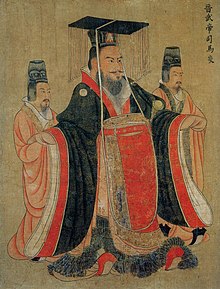Sima Yan
| Sima Yan | |||||||||||||
|---|---|---|---|---|---|---|---|---|---|---|---|---|---|
 |
|||||||||||||
| Reign | 8 February 266 – 16 May 290 | ||||||||||||
| Born | 236 | ||||||||||||
| Died | 16 May 290 (aged 54) | ||||||||||||
| Spouse |
Empress Yang Yan Empress Yang Zhi |
||||||||||||
|
|||||||||||||
| Father | Sima Zhao | ||||||||||||
| Mother | Wang Yuanji | ||||||||||||
| Full name | |
|---|---|
|
Family name: Sima (Chinese: 司馬; pinyin: sī mǎ) Given name: Yan (Chinese: 炎; pinyin: yán) |
|
| Posthumous name | |
| Wu (Chinese: 武; pinyin: wǔ), literary meaning: "martial" |
|
| Temple name | |
| Shizu (Chinese: 世祖; pinyin: shì zǔ) |
Emperor Wu of Jin, (simplified Chinese: 晋武帝; traditional Chinese: 晉武帝; pinyin: Jìn Wǔ Dì; Wade–Giles: Chin Wu-ti; 236 – 16 May 290), personal name Sima Yan (Chinese: 司馬炎; pinyin: Sīmǎ Yán), courtesy name Anshi (安世), was the grandson of Sima Yi and son of Sima Zhao. He became the first emperor of the Jin dynasty (265–420) after forcing Cao Huan, last ruler of the state of Cao Wei, to abdicate to him. He reigned from 265 to 290, and after conquering the state of Eastern Wu in 280, was the emperor of a unified China. Emperor Wu was known for his extravagance and sensuality, especially after the unification of China; legends boasted of his incredible potency among ten thousand concubines.
Emperor Wu was commonly viewed as a generous and kind, but also wasteful, ruler. His generosity and kindness undermined his rule, as he became overly tolerant of the noble families' corruption and wastefulness, which drained the people's resources. Further, when Emperor Wu established the Jin Dynasty, he was concerned about his regime's stability, and, believing that the predecessor state, Cao Wei, had been doomed by its failures to empower the princes of the imperial clan, he greatly empowered his uncles, his cousins, and his sons with authority including high military ranking. This ironically led to the destabilization of the Jin Dynasty, as the princes engaged in an internecine struggle known as the War of the Eight Princes soon after his death, and then the Wu Hu uprisings that nearly destroyed the Jin Dynasty and forced its relocation to the region south of the Huai River.
...
Wikipedia
